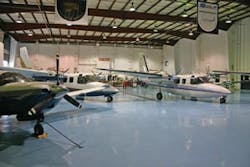PEORIA, IL — According to Larry Byerly, former president of Byerly Aviation, the family fixed base operation (FBO) has been here since late 1949 when his father, R. Millard Byerly, moved his business from neighboring Mt. Hawley Airport. When Millard passed away, Larry and his brother Robert took over operations. In early 2005, Larry made the tough decision to sell the family business to Quantem FBO Services, LLC, a private investment firm headed by president/CEO and long-time industry player Blake Fish; Robert’s son R. Bruce Byerly remains on as the FBO’s vice president. While the industry continues to evolve, Fish and Larry Byerly agree that private investment in FBOs is a trend that will continue, and one that has definite benefits to family-owned businesses as well as the aviation services industry.
Byerly Aviation operates locations at Pekin Municipal Airport and Greater Peoria Regional Airport (PIA) in central Illinois. It’s a full-service fixed base operation, employing some 56 people and providing line service, charter, avionics, interiors, paint, aircraft sales, and maintenance. Some 800,000 gallons of fuel is pumped at Peoria annually, which includes the airlines. Fish estimates that 70 percent of the general aviation operations at PIA are attributable to business aviation.
At Peoria, Byerly Aviation has an executive terminal, two hangars — one for storage, one for maintenance — totaling some 35,000 square feet, as well as four T-hangars totaling some 12,000-square feet. At Pekin, some 10 miles away, the FBO has 15,000 square feet for its strip shop, paint shop, and cabinet and interiors work, as well as two hangars. Byerly also operates the airport there for the city of Pekin.
Besides growing the existing business, Fish sees Peoria as a perfect market for the very light jet, expected to enter service this summer. Fish says that as companies look to grow their businesses through additional locations, mid-market communities like Peoria could benefit by those companies reconsidering cities that may have previously been difficult to reach through commercial airline service.
Decision to Sell
After working in the business his father started since 1959, Byerly says “it was just time,” when asked why he chose to sell the family business. “Interest rates were clear down to 1 percent for banks and a guy could borrow money affordably. I was 70 years old — tired as I could be — I lost my brother Bobby, and I couldn’t fly anymore after four bypass surgeries.”
Byerly sees the interest from private equity in FBOs continuing to grow. “People like us can’t afford it anymore,” he says. “It takes a ton of money and most families have everything in the business; plus you have to sit down with a ton of bureaucrats and make everybody happy.” Like Fish, Byerly sees a lot of synergies and benefits that can be gained in forming a network of FBOs, something that smaller, family-owned businesses often can’t achieve. Plus, says Byerly, looking at the industry, “there’s not a lot of kids coming up behind the gray hairs. That’s troublesome if you want an industry to continue.”
When looking at interested parties, Byerly says he didn’t want to sell the FBO to “the big guys who would come in and rape the place. We’re a family here and Blake was interested in our people, not just making us a gas station.” Fish and Byerly agree that the culture that Quantem brings to Byerly is consistent with the culture that existed at the FBO previously. “That made it easy for us,” says Fish.
Under the actual ownership agreement, AFCO (Aviation Facilities Company, a real estate development and management company specializing in airport and other transportation-related facilities) and Quantem FBO Services, LLC formed a partnership, AFCO Quantem, LLC, which is the parent company of Byerly Aviation.
Quantem FBO Services has a contract with AFCO Quantem to manage Byerly Aviation, while AFCO, as a facilities company, has the bulk of the ownership, explains Fish. In the very near future, Fish expects to announce additional acquisitions by Quantem FBO Services. He explains that, originally, the “ultimate plan was to stay east of the Mississippi [River]... well, that’s not working out. We have to look at operations where they’re available. There’s nothing we won’t look at and consider.”
The goal, says Fish, is to grow Byerly where possible and cross-utilize future acquisitions “where it makes sense.” Using the knowledge and expertise of the employees at the one location to benefit other locations, says Fish, will be a tremendous asset to the entire organization and is one of the many synergies he sees coming out of forming a network of fixed base operations.
Much of the day-to-day operation of Byerly Aviation has stayed the same since the acquisition, says Fish. Payroll and payables have been centralized to Quantem corporate headquarters in Manchester, NH. “But we don’t want to ever take things out of the business that will affect our ability to operate locally,” says Fish.
When Quantem took over at Byerly, Fish says he made it clear to employees that he couldn’t promise things wouldn’t change. “If we don’t change, we die. But I can promise you that we’re not coming in here to slash and burn. There will be changes, but they will be changes to make the business better.”





